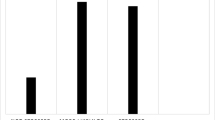Abstract
Post-graduate training for physicians involves a high level of stress. High stress during training has the potential to cause burnout, a well-studied phenomenon in medical trainees. Burnout has previously been shown to increase the risk of mental health problems and medical error in trainees. Little research has been done on the impact of stress on new fellows in general and pediatric cardiology fellows in particular; understanding common sources of stress offers the opportunity to design targeted interventions to support trainee wellness. New trainees in Boston Children’s Hospital’s Pediatric Cardiology Fellowship program were asked to answer to the following question at the beginning of their training: “What are you afraid of in the coming year?” A qualitative content analysis was done on their anonymous responses. Responses were coded and analyzed for common themes. The overall analysis found that 83% of fellows reported fear of “fellowship/career responsibilities.” The second most common theme was “failure/disappointment” (78%) followed by “personal life” (74%), “emotional exhaustion” (61%); least common was “new hospital environment” (37%). The most common individual fear was “increased clinical responsibility” reported by 65% of the new fellows, while 62% reported fears of “imposter syndrome,” and 58% about “burnout.” We found that fellows commonly report fears about both clinical and personal responsibilities, similar to stressors found in studies on residency. It is important for pediatric cardiology fellowships to develop early and specific interventions designed to assist fellows in managing both their new clinical responsibilities and their other stressors.




Similar content being viewed by others
References
Dyrbye LN, Thomas MR, Power DV et al (2010) Burnout and serious thoughts of dropping out of medical school: a multi-institutional study. Acad Med 85:94–102. https://doi.org/10.1097/ACM.0b013e3181c46aad
Linn BS, Zeppa R (1984) Stress in junior medical students: relationship to personality and performance. J Med Educ 59:7–12
Shanafelt TD, Sloan JA, Habermann TM (2003) The well-being of physicians. Am J Med 114:513–519. https://doi.org/10.1016/s0002-9343(03)00117-7
Dyrbye LN, Massie FS, Eacker A et al (2010) Relationship between burnout and professional conduct and attitudes among US medical students. JAMA 304:1173–1180. https://doi.org/10.1001/jama.2010.1318
Dyrbye LN, Thomas MR, Massie FS et al (2008) Burnout and suicidal ideation among U.S. medical students. Ann Intern Med 149:334–341
Dyrbye LN, West CP, Satele D et al (2014) Burnout among U.S. medical students, residents, and early career physicians relative to the general U.S. population. Acad Med 89:443–451. https://doi.org/10.1097/ACM.0000000000000134
Shanafelt TD, Bradley KA, Wipf JE, Back AL (2002) Burnout and self-reported patient care in an internal medicine residency program. Ann Intern Med 136:358–367
Fahrenkopf AM, Sectish TC, Barger LK et al (2008) Rates of medication errors among depressed and burnt out residents: prospective cohort study. BMJ 336:488–491. https://doi.org/10.1136/bmj.39469.763218.BE
Allan CK, Tannous P, DeWitt E et al (2016) A pediatric cardiology fellowship boot camp improves trainee confidence. Cardiol Young 26:1514–1521. https://doi.org/10.1017/S1047951116002614
Levey RE (2001) Sources of stress for residents and recommendations for programs to assist them. Acad Med 76:142–150
Thomas NK (2004) Resident burnout. JAMA 292:2880–2889. https://doi.org/10.1001/jama.292.23.2880
Ey S, Moffit M, Kinzie JM et al (2013) “If you build it, they will come”: attitudes of medical residents and fellows about seeking services in a Resident Wellness Program. J Grad Med Educ 5:486–492. https://doi.org/10.4300/JGME-D-12-00048.1
Golob A, Beste LA, Stern M, Johnson K (2018) Emotional distress among physician residents and fellows: an observational study of trainees seeking counseling visits. Acad Psychiatry 42:25–30. https://doi.org/10.1007/s40596-017-0740-2
Satterfield JM, Becerra C (2010) Developmental challenges, stressors and coping strategies in medical residents: a qualitative analysis of support groups. Med Educ 44:908–916. https://doi.org/10.1111/j.1365-2923.2010.03736.x
West CP, Shanafelt TD, Kolars JC (2011) Society of general internal medicine. J Gen Intern Med 26:1–620. https://doi.org/10.1007/s11606-011-1730-9
Author information
Authors and Affiliations
Contributions
DB, ZG, and EB contributed to the study conception and design. Data collection and analysis were performed by GB and ZG. The first draft of the manuscript was written by GB and all authors commented on previous versions of the manuscript. All authors read and approved the final manuscript.
Corresponding author
Ethics declarations
Conflict of interest
The authors declare that they have no conflict of interest. This research did not receive any specific grant from funding agencies in the public, commercial, or not-for-profit sectors.
Ethical Approval
The Institutional Review Board of Boston Children’s Hospital (IRB00000352) reviewed the protocol and determined that it qualified as exempt from the requirements of 45 CFR 46. This determination was made because it was limited to research activities in which the only involvement of human subjects was in the following category: Secondary research for which consent was not required as the information was recorded in such a manner that the identity of subjects cannot be readily ascertained directly or through identifiers linked to the subjects and the investigators did not contact or re-identify the subjects.
Informed Consent
The Institutional Review Board of Boston Children’s Hospital determined that informed consent was not required for this protocol as explained above.
Additional information
Publisher's Note
Springer Nature remains neutral with regard to jurisdictional claims in published maps and institutional affiliations.
Rights and permissions
About this article
Cite this article
Brown, D.W., Binney, G., Gauthier, Z. et al. Fears and Stressors of Trainees Starting Fellowship in Pediatric Cardiology. Pediatr Cardiol 41, 677–682 (2020). https://doi.org/10.1007/s00246-019-02276-z
Received:
Accepted:
Published:
Issue Date:
DOI: https://doi.org/10.1007/s00246-019-02276-z




